 This year's "Blog for Choice Day" asks that we all consider the importance of using our votes to support political candidates who are committed to preserving, fortifying and extending reproductive freedom in the United States. And when I contemplated how I might contribute a post to this event, I couldn't help but reflect on how unplanned pregnancies popped up all over the cinematic landscape in 2007. Notably, unplanned pregnancy provided the narrative impetus for the three of the most acclaimed -- in both critical and box-office terms -- comedies of the year (Knocked Up, Waitress and Juno). Yet, in a paradox that we might call "The Smushmortion Contradiction of 2007", the word abortion was nearly unmentioned in U.S. cinema. (The Romanian film 4 Weeks, 3 Weeks and 2 Days, which I have not yet had the opportunity to see, seems to an international exception proving this year's American rule). Any number of feminists have commented on this "Smushmortion Contradiction" -- see my favorite such post here -- but I found myself most interested in how the delicacy, the tentativeness, the fear with which the option of terminating a pregnancy is treated in film today, a full 1/3 century after Roe v. Wade. Indeed, this trepidation seems such a start contrast to films from the first decade after Roe, suggesting that contemporary U.S. filmmakers are trapped inside The Lake of Fire, censoring themselves for fear of controversy. Think back to some of those films of the 1980s, films which unobtrusively took for granted that the world was a better place for women when they had the option of choice: the frankness of Jennifer Jason Leigh's character arc in Fast Times at Ridgemont High; the terror of the botched abortion in Dirty Dancing; and the character arc performed by...
This year's "Blog for Choice Day" asks that we all consider the importance of using our votes to support political candidates who are committed to preserving, fortifying and extending reproductive freedom in the United States. And when I contemplated how I might contribute a post to this event, I couldn't help but reflect on how unplanned pregnancies popped up all over the cinematic landscape in 2007. Notably, unplanned pregnancy provided the narrative impetus for the three of the most acclaimed -- in both critical and box-office terms -- comedies of the year (Knocked Up, Waitress and Juno). Yet, in a paradox that we might call "The Smushmortion Contradiction of 2007", the word abortion was nearly unmentioned in U.S. cinema. (The Romanian film 4 Weeks, 3 Weeks and 2 Days, which I have not yet had the opportunity to see, seems to an international exception proving this year's American rule). Any number of feminists have commented on this "Smushmortion Contradiction" -- see my favorite such post here -- but I found myself most interested in how the delicacy, the tentativeness, the fear with which the option of terminating a pregnancy is treated in film today, a full 1/3 century after Roe v. Wade. Indeed, this trepidation seems such a start contrast to films from the first decade after Roe, suggesting that contemporary U.S. filmmakers are trapped inside The Lake of Fire, censoring themselves for fear of controversy. Think back to some of those films of the 1980s, films which unobtrusively took for granted that the world was a better place for women when they had the option of choice: the frankness of Jennifer Jason Leigh's character arc in Fast Times at Ridgemont High; the terror of the botched abortion in Dirty Dancing; and the character arc performed by...

...Antonia Franceschi in Fame (1980).
approximately 6 minutes and 51 seconds
8 scenes
roughly 5% of film's total running time
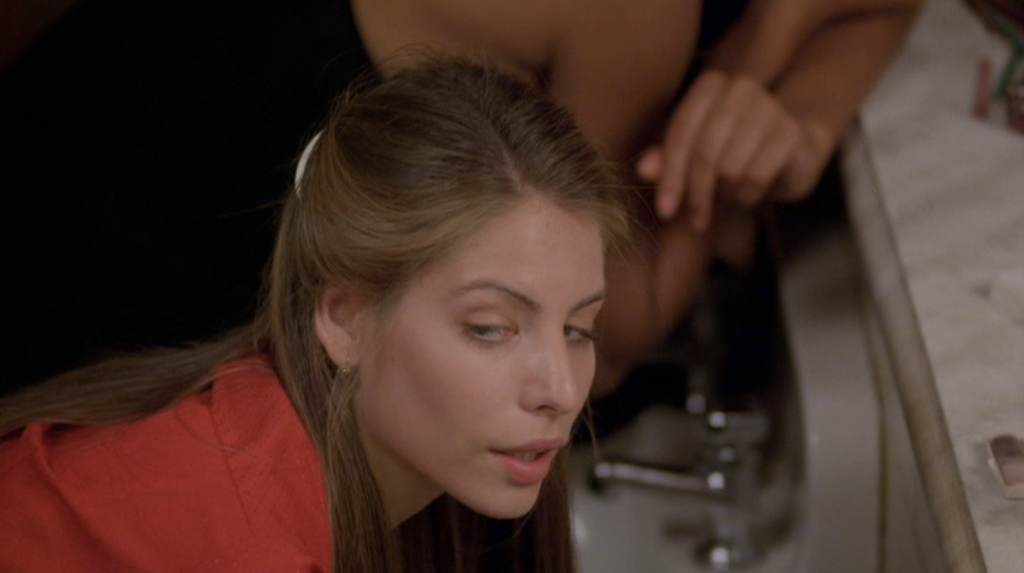 Franceschi's Hilary is a gifted dancer, who brandishes her racial and economic privilege with weary cruelty. She hates her stepmother, reveres her absent mother, and seems intent on being a "bad girl" ostensibly to get the attention of her distracted father.
Franceschi's Hilary is a gifted dancer, who brandishes her racial and economic privilege with weary cruelty. She hates her stepmother, reveres her absent mother, and seems intent on being a "bad girl" ostensibly to get the attention of her distracted father.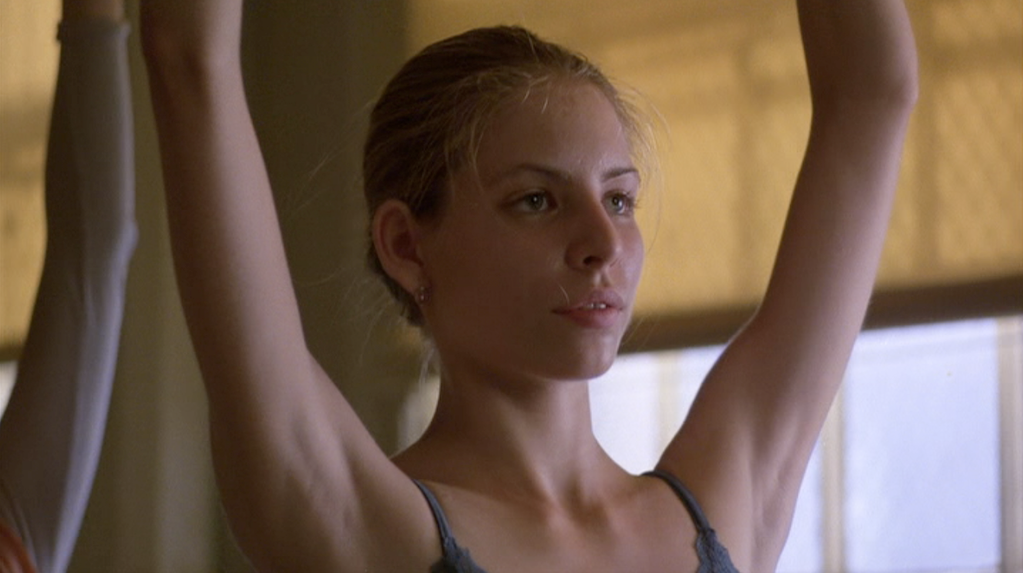 The film tells us little of Hilary's backstory (though it seems safe to assume that she's been kicked out of any number of "better" schools than Performing Arts).
The film tells us little of Hilary's backstory (though it seems safe to assume that she's been kicked out of any number of "better" schools than Performing Arts).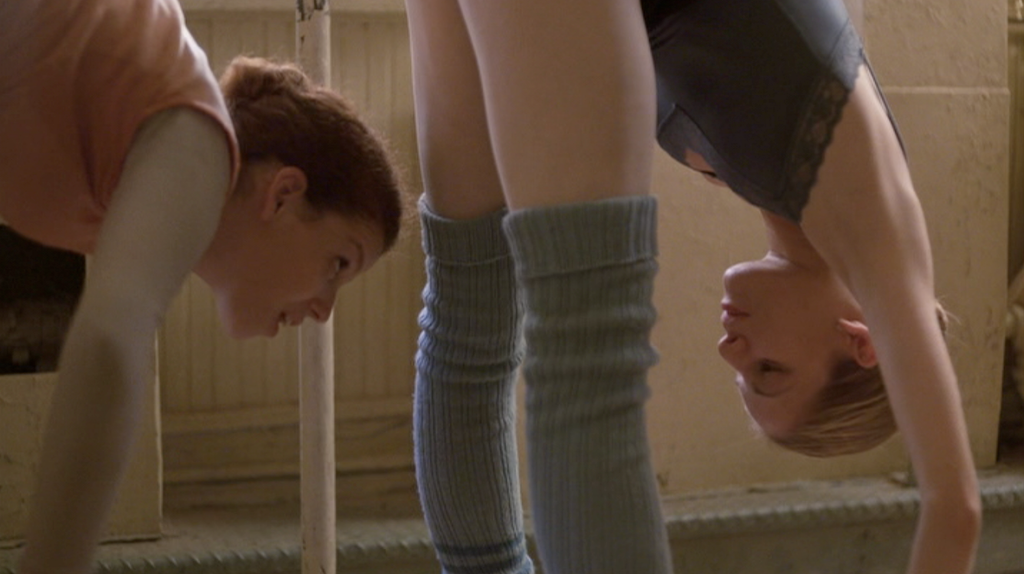 Franceschi's performance operates in slow reveal. When we first see her, gossiping in ballet class, she seems like just another dancing princess. But within a quick set of dialog-while-dancing scenes, Franceschi begins to show that her Hilary is neither a delicate ballerina nor a talentless rich bitch.
Franceschi's performance operates in slow reveal. When we first see her, gossiping in ballet class, she seems like just another dancing princess. But within a quick set of dialog-while-dancing scenes, Franceschi begins to show that her Hilary is neither a delicate ballerina nor a talentless rich bitch.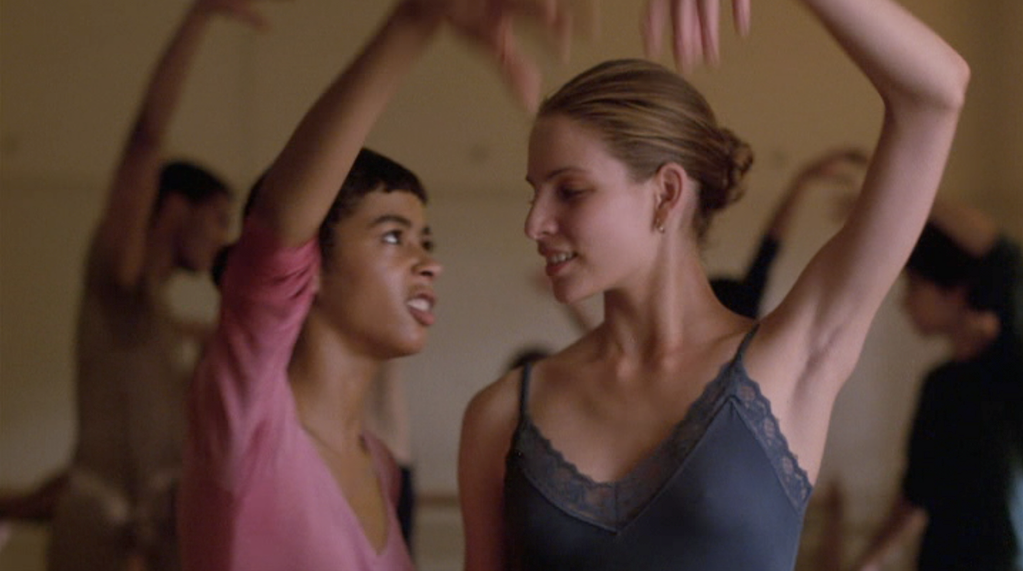 Rather, she's a badass on pointe.
Rather, she's a badass on pointe.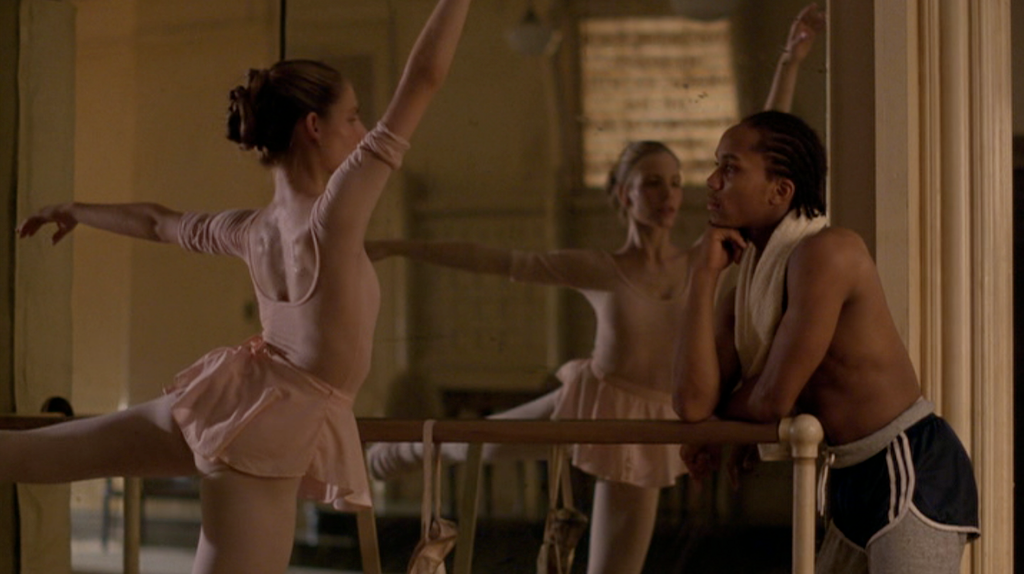 Franceschi's Hilary seduces the film's "wicked" Leroy and, without condescension, Franceschi clues us in that Hilary's erotic rebellion against her Park Avenue privilege is complicated. As Franceschi's Hilary chatters about herself while escorting Leroy through the fanciest building he's ever been in, Franceschi begins to show that behind that bravado of a white girl who can banter with the black girls ("yes, but who wants diabetes") stands a young woman not sure whether she's loved.
Franceschi's Hilary seduces the film's "wicked" Leroy and, without condescension, Franceschi clues us in that Hilary's erotic rebellion against her Park Avenue privilege is complicated. As Franceschi's Hilary chatters about herself while escorting Leroy through the fanciest building he's ever been in, Franceschi begins to show that behind that bravado of a white girl who can banter with the black girls ("yes, but who wants diabetes") stands a young woman not sure whether she's loved.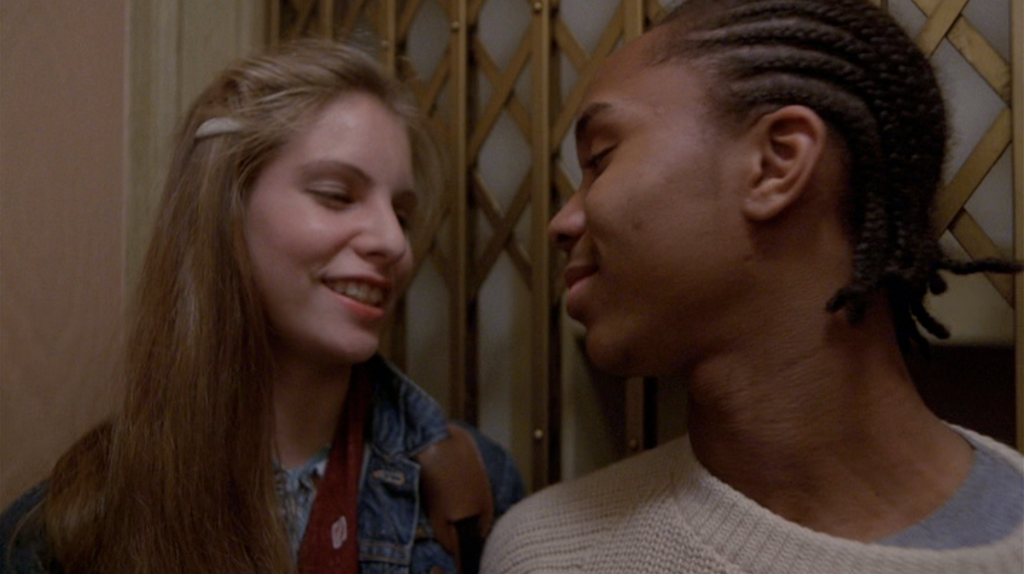 And the slow reveal of Franceschi's performance is echoed in the character's longest, simplest and most memorable scene.
And the slow reveal of Franceschi's performance is echoed in the character's longest, simplest and most memorable scene.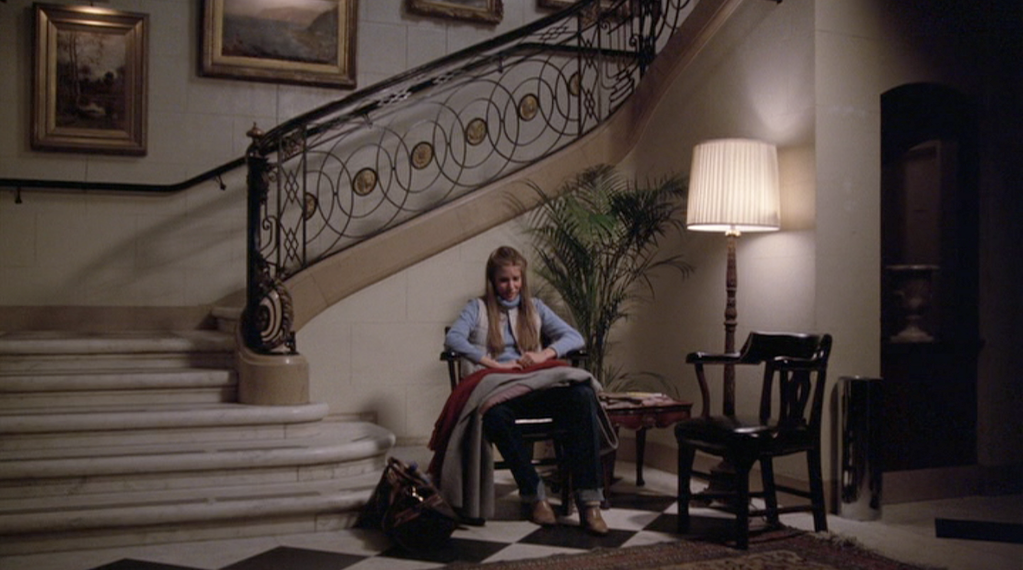 Director Alan Parker frames Franceschi's Hilary in a long shot, showing her sitting in a chair at the base of an opulent staircase. As the character rattles about her difficult decision to accept a position in a West Coast ballet company, rationalizing and justifying and explaining the sacrifice, his camera slowly climbs in toward her in a single shot. Franceschi's Hilary continues to talk about her dreams as a dancer and, as she details her fantasies about the legendary roles "just coming out of her feet," emotions well to the surface of Franceschi's face, its adolescent angles highlighting Hilary's vulnerability and isolation.
Director Alan Parker frames Franceschi's Hilary in a long shot, showing her sitting in a chair at the base of an opulent staircase. As the character rattles about her difficult decision to accept a position in a West Coast ballet company, rationalizing and justifying and explaining the sacrifice, his camera slowly climbs in toward her in a single shot. Franceschi's Hilary continues to talk about her dreams as a dancer and, as she details her fantasies about the legendary roles "just coming out of her feet," emotions well to the surface of Franceschi's face, its adolescent angles highlighting Hilary's vulnerability and isolation.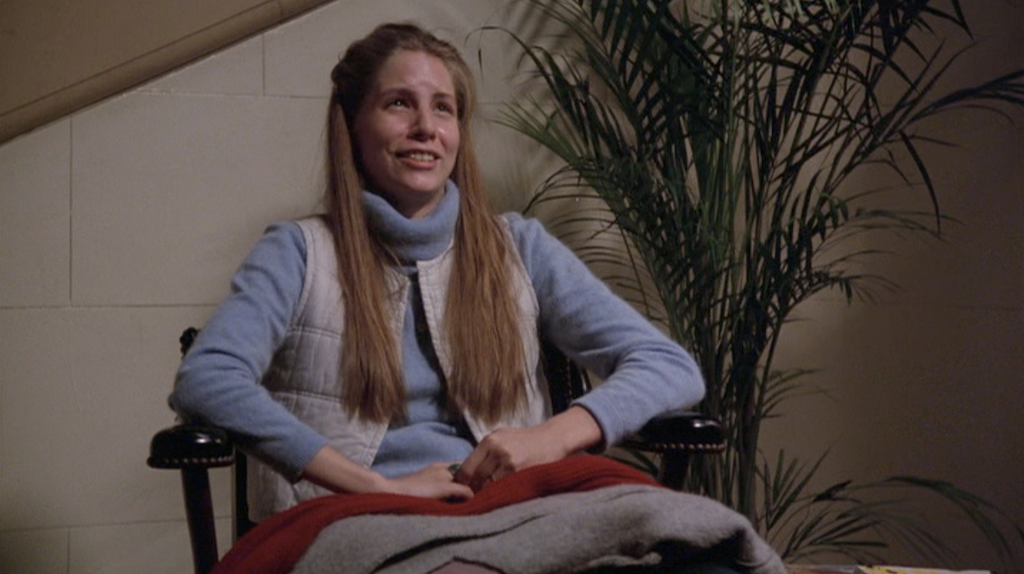 And in one of the great "gotchas" of American melodrama (I've seen the scene literally hundreds of times and it invariably squeezes my heart every time), the camera's first look away from Franceschi's Hilary is to a woman in a starched nurse's cap, followed by Hilary's reveal: "There's just no room for a baby." To which the nurse, not unkindly, asks whether she'll be paying with MasterCharge or AmericanExpress. Only then does the film settle into an acknowledgment that Hilary's pregnant, probably by Leroy, and is now deciding to terminate the pregnancy. And in a flash, all that comes before resonates in an entirely different depth. (A critique of this scene -- that the film sets Hilary up as a sexually empowered girl/woman only to punish her for precisely that; that white women with resources always have access to medical procedures that poorer, browner women don't -- might be right, but there's something else in the character that, for me, is just as crucial. The film allowed me, as a Fame-obsessed teenaged sissyboy in the early 80s, to empathize with the dilemma of choice. My reaction to the character then is much like my reaction now. I remember not liking the character at all, hating her a little and fearing her a lot, until this final scene when I, for the first time, empathized with the difficulty of her decision to terminate her pregnancy. And when was the last time a mainstream US film allowed you to empathize with the challenge of choice in such a complex, humane way?)
And in one of the great "gotchas" of American melodrama (I've seen the scene literally hundreds of times and it invariably squeezes my heart every time), the camera's first look away from Franceschi's Hilary is to a woman in a starched nurse's cap, followed by Hilary's reveal: "There's just no room for a baby." To which the nurse, not unkindly, asks whether she'll be paying with MasterCharge or AmericanExpress. Only then does the film settle into an acknowledgment that Hilary's pregnant, probably by Leroy, and is now deciding to terminate the pregnancy. And in a flash, all that comes before resonates in an entirely different depth. (A critique of this scene -- that the film sets Hilary up as a sexually empowered girl/woman only to punish her for precisely that; that white women with resources always have access to medical procedures that poorer, browner women don't -- might be right, but there's something else in the character that, for me, is just as crucial. The film allowed me, as a Fame-obsessed teenaged sissyboy in the early 80s, to empathize with the dilemma of choice. My reaction to the character then is much like my reaction now. I remember not liking the character at all, hating her a little and fearing her a lot, until this final scene when I, for the first time, empathized with the difficulty of her decision to terminate her pregnancy. And when was the last time a mainstream US film allowed you to empathize with the challenge of choice in such a complex, humane way?)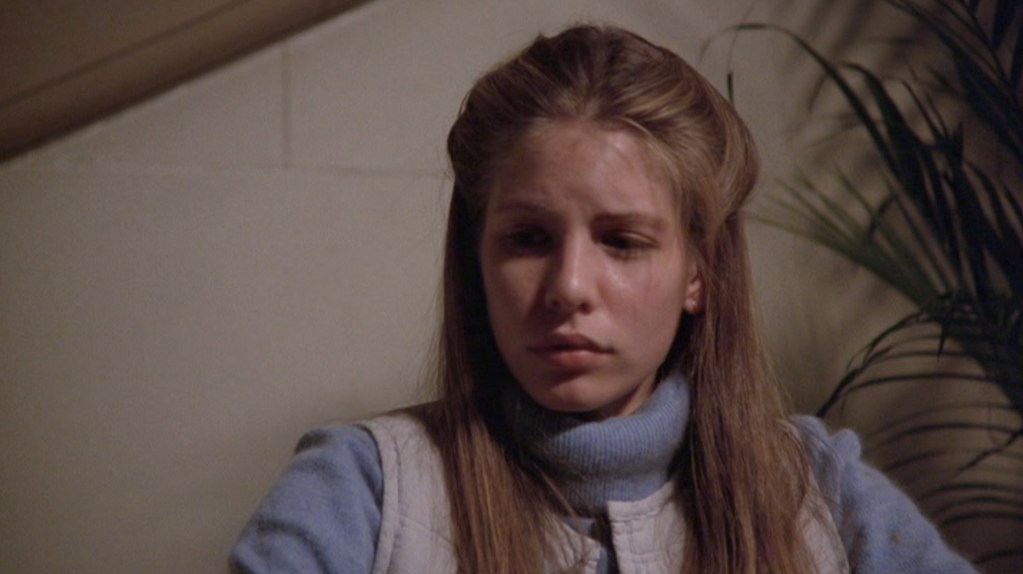 Franceschi's raw emotional openness -- the uncertainty of her certainty that she's making the right choice for herself and her future -- is staggeringly apt for an actress in her screen debut. Franceschi's Hilary offers an astonishingly rare presentation of the emotional complexity of choice and, because I can honestly say that her character presented my first challenge to think seriously about reproductive freedom, I'm grateful that I started that journey following the terms instigated by Antonia Franceschi's performance. This brief scene is frank, simple, brutal, honest, emotional, and humane -- in short, precisely what qualities we must prioritize when having conversations about reproductive freedom. Voting to support reproductive freedom is my "voting issue", my only litmus test to determine whether or not I can or will support a candidate. As a gay man with no plans to parent, that may seem odd. But, for me, it's a no-brainer. Our choice to, or not to, procreate should not determine our value in a free society. Which is why, after this cinematic year of the Smushmortion, I am so grateful that I came to cinematic consciousness when I did, when a women's right to choose was depicted not a lake of fire but as one option along the path toward her best future.
Franceschi's raw emotional openness -- the uncertainty of her certainty that she's making the right choice for herself and her future -- is staggeringly apt for an actress in her screen debut. Franceschi's Hilary offers an astonishingly rare presentation of the emotional complexity of choice and, because I can honestly say that her character presented my first challenge to think seriously about reproductive freedom, I'm grateful that I started that journey following the terms instigated by Antonia Franceschi's performance. This brief scene is frank, simple, brutal, honest, emotional, and humane -- in short, precisely what qualities we must prioritize when having conversations about reproductive freedom. Voting to support reproductive freedom is my "voting issue", my only litmus test to determine whether or not I can or will support a candidate. As a gay man with no plans to parent, that may seem odd. But, for me, it's a no-brainer. Our choice to, or not to, procreate should not determine our value in a free society. Which is why, after this cinematic year of the Smushmortion, I am so grateful that I came to cinematic consciousness when I did, when a women's right to choose was depicted not a lake of fire but as one option along the path toward her best future.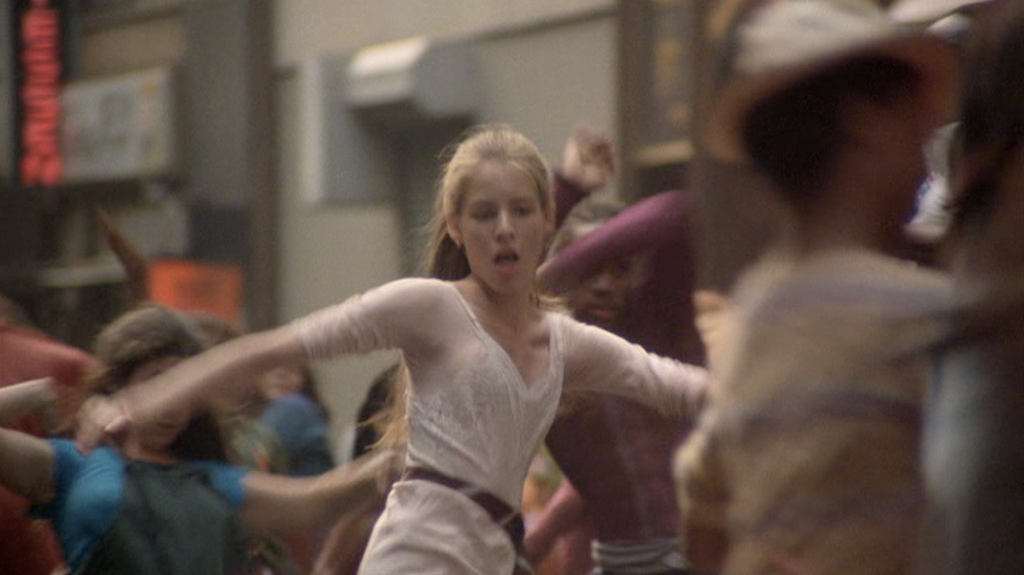 Take a look at Antonia Franceschi's work in Fame again. It's the work of a fine young actress who's gone on to become a formidable dancer and performance artist in the UK. And consider using your vote this year to support, fortify and extend reproductive freedom.
Take a look at Antonia Franceschi's work in Fame again. It's the work of a fine young actress who's gone on to become a formidable dancer and performance artist in the UK. And consider using your vote this year to support, fortify and extend reproductive freedom.

2 comments:
And it's very interesting that with nominations, 4 months, 3 weeks and 2 days didn't get a nom for foreign. Especially after all the recognition it's garnered. I'm very disappointed actually, but I think it's the subject matter. It's a harrowing film, and doesn't fit in the strange "I'm going to go ahead and have my baby against all odds" film universe of 2007.
You're so awesome. Beautiful post!
Post a Comment